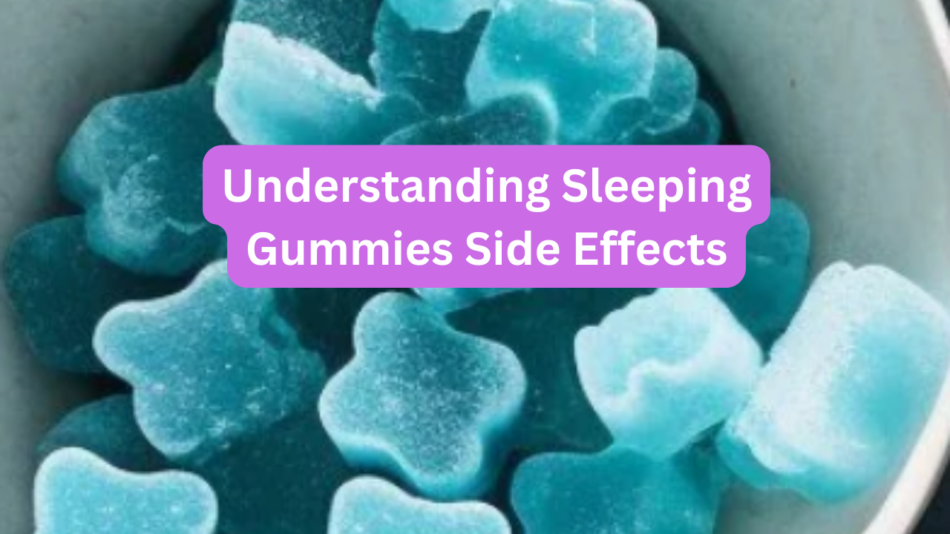
In the quest for restful nights, many have turned to sleep aids like sleeping gummies. These chewable treasures promise to send you off to dreamland without the hassle of swallowing pills. But as with any magic potion, it’s wise to read the fine print.
What are the sleeping gummies side effects? In brief, while often mild, they can include drowsiness the next day, changes in mood, and potential interactions with medications.
The Ingredients and Their Shadows
Sleeping gummies aren’t just sugar and dreams; they’re a cocktail of components, each with its sideshow. Let’s delve into what they contain and the side effects they might usher in:
- Melatonin is the poster child for sleep support, yet it can cause headaches, dizziness, and nausea.
- Herbal Ingredients: Chamomile and valerian root are calming, but they might interact with certain medications.
- L-theanine promotes relaxation but can lead to upset stomachs in some.
- Magnesium is a mineral hero for sleep, though too much can lead to diarrhea.
- Vitamins are essential for health, but an excess, particularly of fat-soluble vitamins, can be harmful.
- CBD: is known for reducing anxiety, yet it’s not without potential liver impacts and interactions.
- GABA: Aids in calming the brain, but overuse might affect mood.
- 5-HTP: This can improve sleep quality but might lead to gastrointestinal issues or serotonin syndrome when combined with certain medications.
- Tart Cherry: Provides natural melatonin but can cause stomach discomfort.
- Passionflower: Enhances GABA levels but might cause dizziness.
- Lemon balm reduces stress but may lead to fatigue.
- Inositol is beneficial for anxiety but can lead to nausea or tiredness.
Beyond the Night: Prolonged Use Concerns
Using sleeping gummies over a long period of time can invite an array of concerns, including:
- Tolerance Development: The body may become accustomed to the supplements, requiring higher doses.
- Dependency: emotional or psychological reliance on gummies for sleep.
- Interaction with Medications: Potential for adverse reactions when mixed with other drugs.
- Hormonal Imbalance: Long-term melatonin use might affect hormonal health.
- Nutritional Deficiencies: Overreliance on gummies might lead to neglect of dietary sources of sleep-promoting nutrients.
- Alteration of Sleep Architecture: Potential impact on the natural stages of sleep.
- Withdrawal Symptoms: experiencing insomnia or anxiety when stopping gummies.
- Gastrointestinal Issues: Long-term use of certain ingredients can upset stomach health.
- Mood Fluctuations: Changes in mood or increased anxiety with prolonged use.
- Immune System Impact: Overuse of immune-stimulating ingredients can have counterproductive effects.
- Cost: the financial impact of regular purchases and uses.
- Environmental Consideration: Packaging and Production Sustainability.
The Body’s Call: Listening to What You Need
It’s essential to tune into your body’s responses and recognize when sleeping gummies’ side effects overshadow their benefits. Alternatives and lifestyle adjustments can also pave the way to better sleep:
- Establishing a Sleep Routine: Consistency is key to training your body to recognize sleep time.
- Mindfulness and Relaxation Techniques: Meditation and yoga can ease the mind into restfulness.
- Dietary Adjustments: Incorporating foods rich in magnesium, calcium, and B vitamins.
- Physical Activity: Regular exercise healthily promotes fatigue, encouraging sleep.
- Limiting Screen Time: Reducing exposure to blue light in the evening can help signal your body that it’s time to wind down.
FAQs: Unraveling Sleeping Gummies Mysteries
Can sleeping gummies cause next-day drowsiness?
Yes, one of the common side effects is feeling groggy the following day, as the body processes the active ingredients.
Are there any age restrictions for using sleeping gummies?
Most sleeping gummies are recommended for adults. For children or teenagers, it’s crucial to consult a healthcare provider before use, as the need for such supplements might indicate underlying issues.
How long can I safely use sleeping gummies?
While this varies by individual and product, it’s advisable to use them for short periods. Long-term use should be discussed with a healthcare professional to avoid potential side effects or dependency.
Navigating the night with sleeping gummies can be a gentle voyage into dreamland for many. Yet, like any journey, it’s wise to map out the route and be aware of potential bumps along the way. The side effects of sleeping gummies, ranging from mild discomforts to more significant concerns, underscore the importance of using them judiciously and in harmony with a holistic approach to sleep wellness. Whether you’re considering adding them to your nighttime routine or reassessing their place in it, remember that the goal is not just to sleep but to wake up refreshed and ready to embrace the day. After all, the quality of our nights profoundly influences the quality of our days.